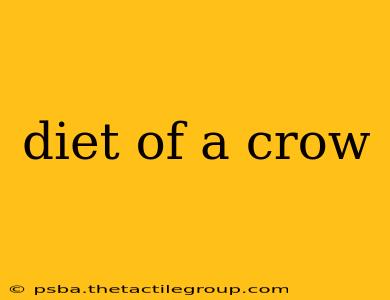Crows, those ubiquitous black birds often seen perched on power lines or scavenging in fields, possess a remarkably adaptable diet. Far from being simple scavengers, crows are opportunistic omnivores with a surprisingly varied menu. Understanding their feeding habits reveals a fascinating insight into their intelligence and ecological role.
What Do Crows Eat? A Breakdown of Their Diverse Diet
The diet of a crow is dictated largely by availability and season. While they're known for scavenging, their foraging habits encompass a wide spectrum of food sources:
1. Carrion and Animal Matter:
- Insects: A significant portion of a crow's diet consists of insects, including beetles, caterpillars, grasshoppers, and crickets. They are highly efficient at locating and consuming insect larvae, contributing to pest control.
- Small Animals: Crows will readily prey on small vertebrates like mice, voles, lizards, snakes (occasionally), frogs, and even birds' eggs and nestlings. Their intelligence allows them to successfully hunt these creatures.
- Carrion: A crucial aspect of their diet, particularly in lean times. Crows play a vital role in cleaning up carcasses, preventing the spread of disease.
- Fish: Crows living near water sources will sometimes opportunistically catch or scavenge fish.
2. Plant-Based Foods:
- Fruits and Berries: Depending on the season and location, crows consume a variety of fruits and berries, supplementing their diet with essential vitamins and sugars.
- Seeds and Grains: Agricultural fields provide an abundant source of seeds and grains, often making up a large portion of their diet, especially during the harvest season. This can lead to conflicts with farmers.
- Nuts and Acorns: Crows are known to cache nuts and acorns, displaying remarkable memory and planning abilities in storing food for later consumption.
3. Human-Provided Food:
- Waste: Sadly, a considerable part of a crow's diet in urban and suburban areas comes from human waste. This includes discarded food scraps, leftovers, and garbage.
- Pet Food: Crows aren't averse to raiding pet food bowls if given the opportunity.
The Intelligence Behind the Diet: Adaptability and Problem-Solving
The crow's dietary flexibility is a testament to its remarkable intelligence. Their capacity for problem-solving and adaptation allows them to exploit a variety of food sources effectively. They exhibit complex foraging behaviors, including:
- Tool Use: Crows have been observed using tools to access food, showcasing a high level of cognitive ability.
- Cacheing: Their ability to store food for later use demonstrates advanced planning and memory skills.
- Social Learning: Crows learn from observing other crows, expanding their foraging knowledge and efficiency.
The Ecological Role of Crows and Their Diet
Crows play a crucial role in their ecosystems. Their scavenging habits help control disease by removing carcasses, while their insect consumption aids in pest control. However, their affinity for agricultural produce can sometimes lead to conflict with farmers. Understanding their dietary habits is essential for managing their populations and mitigating potential conflicts.
Conclusion: More Than Just Scavengers
The diet of a crow is far more nuanced and fascinating than many realize. Their opportunistic omnivory, combined with their remarkable intelligence and adaptability, makes them incredibly successful and ecologically important birds. Next time you see a crow, remember the diverse and intricate food web it contributes to.

